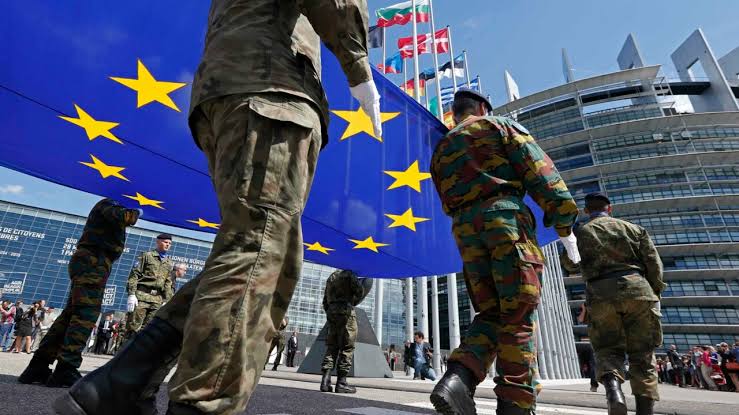Can Europe fund its defence and secure its future

By Anita Mathur
Recent debates in Europe over defence capabilities have underscored a harsh reality: the continent is unprepared to defend itself without substantial reliance on the United States.
This reliance raises critical questions about whether Europe has the political will and economic capacity to adapt in order to safeguard its freedoms and way of life.
Since Russia’s invasion of Ukraine in February 2022, these questions have become more urgent, yet European nations remain divided and hesitant to commit to meaningful reforms in defence spending and strategy.
The leaders of Latvia, Estonia, and Finland – nations bordering Russia – have voiced their concerns, urging NATO to move beyond debates and take decisive action against the threat posed by Moscow.
These front-line states, which have consistently spent a high percentage of their GDP on defence, exemplify the urgency of the matter.
However, NATO as a whole remains reliant on US leadership and military power, raising doubts about its effectiveness in a scenario where American support is diminished.
The election of Donald Trump as US president highlighted this vulnerability. Trump’s scepticism of NATO and his pointed remarks about member states failing to meet their financial obligations forced European nations to confront their dependence on Washington.
Trump’s February 2024 statement that he would let Russia act against NATO members failing to meet their spending commitments sent shockwaves through the alliance.
Despite such provocations, European nations have been slow to act, and most still fall short of NATO’s 2 percent GDP target for defence spending, let alone the 5 percent that some argue is necessary.
Even if European nations were to increase their defence budgets dramatically, the road to self-sufficiency would be fraught with challenges. The research and industrial sectors vital to defence have been increasingly driven by market forces and profit motives rather than strategic security goals.
This leaves Europe ill-equipped to develop the robust defence infrastructure needed to replace American support.Russia’s defence spending, projected to exceed 6 percent of its GDP in 2025, serves as a stark contrast.
In comparison, major European powers like the UK and France are struggling to reach or sustain even the modest 2 percent NATO target. Germany, for instance, spent 2 percent of its GDP on defence in 2024 but is not expected to exceed that level until at least 2028.
These figures highlight a fundamental mismatch between Europe’s defence ambitions and its financial commitments.
Money alone will not solve Europe’s defence shortcomings. The rapidly evolving nature of warfare complicates planning and procurement. Advances in technology, the emergence of cyberwarfare, and the increasing role of artificial intelligence have rendered many traditional military strategies obsolete.
For example, the UK is undergoing its third strategic defence review in four years, grappling with questions about the balance between conventional and unconventional capabilities.
Should Europe prioritize large standing armies and traditional hardware, or should it focus on advanced technologies like cyber capabilities and AI-driven systems? These questions have no easy answers, and the trade-offs involved make strategic planning a daunting task.
Britain’s approach of spreading resources across various priorities has led to diminished effectiveness, with reports suggesting that its standing army could be depleted within six months of conflict.
France and Germany face similar dilemmas, hampered by political, budgetary, and strategic constraints.Europe’s fragmented political landscape further complicates efforts to build a unified defense strategy.
Disagreements among EU member states over budget allocations, strategic priorities, and the role of NATO hinder progress. This disunity weakens Europe’s ability to respond effectively to external threats and undermines its credibility as a cohesive geopolitical actor.
The European Union’s ambitions for “strategic autonomy” remain largely aspirational. Proposals for a unified European defence force have been met with scepticism, not only because of logistical and financial challenges but also due to fears of undermining NATO’s role.
Yet without greater coordination and a shared vision, Europe’s reliance on the US will persist, leaving it vulnerable to shifting American priorities.Failing to address these issues comes with significant risks.
The changing global security environment demands that Europe adapt quickly to new realities. Hybrid threats, asymmetric warfare, and state-sponsored cyberattacks are becoming more prevalent, requiring innovative and flexible responses. Yet Europe’s slow pace of reform leaves it ill-prepared to face these challenges.
To make matters worse, public awareness of these threats remains low. European leaders must do more to communicate the necessity of increased defence spending to their citizens.
This includes explaining the trade offs involved, such as potential cuts to social services or the need for higher taxes. Without public buy-in, achieving the political consensus required for meaningful change will be difficult.
Europe’s path to self-reliance in defence will require more than just increased spending. It must also involve a comprehensive overhaul of its strategic priorities, research and development capabilities, and industrial base.
This includes:Strengthening Defence Collaboration: European nations must deepen cooperation on defence projects, pooling resources and expertise to develop cutting-edge technologies and systems. Initiatives like the European Defence Fund should be expanded and prioritized.
Modernizing Military Forces: Investments in modernizing military capabilities must be guided by a clear strategic vision. This includes balancing conventional forces with emerging technologies to address both traditional and unconventional threats.
Enhancing Cybersecurity: Given the growing importance of cyberwarfare, Europe must invest heavily in cybersecurity infrastructure and capabilities. This includes developing offensive and defensive capabilities to deter and respond to cyberattacks.
Engaging the Public: Leaders must make a compelling case for increased defence spending, emphasizing the importance of security in safeguarding economic prosperity and democratic values.
The question of whether Europe can afford to pay for its own defence is not just a matter of financial capacity but also of political will and strategic foresight.
As threats continue to evolve, Europe cannot afford to remain complacent. While reliance on the US may provide short-term security, it is not a sustainable long-term strategy.
To secure its future, Europe must embrace the hard choices required to build a self-sufficient and resilient defence posture. Only by doing so can it ensure the preservation of its freedoms and way




